Anti-Monopoly Agenda for “A Stronger Online Economy: Opportunity, Innovation, Choice”
Bipartisan legislation will restore competition to digital marketplace and rein in largest tech platforms
House Judiciary Committee’s antitrust subcommittee’s 450 page report -stated that their found “significant evidence” that big tech companies’ anticompetitive conduct. Effectively snuffing out competition, attributed to hampering innovation, narrowing consumer’s choice and could be inferred as weakening our democracy.
The 2020 Report makes numerous findings - as detailed in the Chairman’s forward - which reads in part:
“…including about evidence concerning the extent to which they have exploited, entrenched, and expanded their power over digital markets in anticompetitive and abusive ways. Their answers were often evasive and non-responsive, raising fresh questions about whether they believe they are beyond the reach of democratic oversight.
By controlling access to markets, these giants can pick winners and losers throughout our economy. They not only wield tremendous power, but they also abuse it by charging exorbitant fees, imposing oppressive contract terms, and extracting valuable data from the people and businesses that rely on them.
you should have paid attention
…they have surveilled other businesses to identify potential rivals, and have ultimately bought out, copied, or cut off their competitive threats. And, finally, these firms have abused their role as intermediaries to further entrench and expand their dominance.
Whether through self-preferencing, predatory pricing, or exclusionary conduct, the dominant platforms have exploited their power in order to become even more dominant.
Our laws must be updated to ensure that our economy remains vibrant and open in the digital age.
Congress must also ensure that the antitrust agencies aggressively and fairly enforce the law.
Over the course of the investigation, the Subcommittee uncovered evidence that the antitrust agencies failed, at key occasions, to stop monopolists from rolling up their competitors and failed to protect the American people from abuses of monopoly power. Forceful agency action is critical.
House Report Facebook
Subcommittee staff found evidence of Facebook’s monopolization and it’s unique monopoly power. For example, the strong network effects associated with Facebook has tipped the market toward monopoly such that Facebook competes more vigorously among its own products—Facebook, Instagram, WhatsApp, and Messenger—than with actual competitors….
The House Subcommittee acquired internal emails from Facebook Executives;
Facebook has also maintained its monopoly through a series of anticompetitive business practices. The company used its data advantage to create superior market intelligence to identify nascent competitive threats and then acquire, copy, or kill these firms. Once dominant, Facebook selectively enforced its platform policies based on whether it perceived other companies as competitive threats.
House Report on Google:
Google’s ability to weaponize both “general online search and search advertising” provided them with an extremely precise weapon that effectively killed any such competition. In the event a new company emerged as a threat to Google’s monopoly— Google would either strangle that company by insanely expensive
“entities seeking to reach users must pay Google steadily increasing sums for ads…Google to a gatekeeper that is extorting users for access to its critical distribution channel, even as its search page shows users less relevant results”
Google has maintained its monopoly over general search has been through a series of anticompetitive contracts. After purchasing the Android operating system in 2005, Google used contractual restrictions and exclusivity provisions to extend Google’s search monopoly from desktop to mobile
Google increasingly functions as an ecosystem of interlocking monopolies…
House Report on Amazon
This is a very nuanced summation —on one hand the House is saying that recent reports of Amazon’s markets share is about 40% - based on documents and surveys obtained by the House - they estimated that Amazon’s “real” market share is likely over 50%… important side note both of those figures might actually be incorrect. Meaning by stating Amazon’s market share is >50% that establishes a predicate for the House to say “see we told you they are a monopoly” whereas Amazon position is to say around 40% and they could credibly argue “we aren’t a monopoly” - this is a scenario where the knife can cut both ways so it’s important to keep that in mind as you read the report.
…Amazon is frequently described as controlling about 40% of U.S. online retail sales, this market share is likely understated, and estimates of about 50% or higher are more credible.
Publicly, Amazon describes third-party sellers as “partners.” But internal documents show that, behind closed doors, the company refers to them as “internal competitors.”
Amazon’s dual role as an operator of its marketplace that hosts third-party sellers, and a seller in that same marketplace, creates an inherent conflict of interest. This conflict incentivizes Amazon to exploit its access to competing sellers’ data and information, among other anticompetitive conduct.
House Report on Apple;
Of course the report largely focused on Apple’s App Store and while I do not disagree that the App Store original concept was a synergistic win-win for the Company, App Developers and end users… it does create a very anticompetitive ecosystem
…exploit app developers through misappropriation of competitively sensitive information and to charge app developers supra-competitive prices within the App Store. Apple has maintained its dominance due to the presence of network effects, high barriers to entry, and high switching costs in the mobile operating system market.
Amazon’s Response:
Let’s be candid - Amazon came out with all guns blazing and it’s hard to reconcile their rather unhinged and caustic response to the well articulated report
Fringe notions on antitrust would destroy small businesses and hurt consumers…Misguided interventions in the free market would kill off independent retailers and punish consumers by forcing small businesses out of popular online stores, raising prices, and reducing consumer choice and convenience.
Google’s Response:
While certainly not as provocative as Amazon’s response - Google’s response is some fine Triple AAA gilded subterfuge and I do not mean that in a complimentary way - their response reads in part (but then pivots to CDA-230 - I’m not going to regurgitate my past research on that topic)
“We compete fairly in a fast-moving and highly competitive industry. We disagree with today's reports, which feature outdated and inaccurate allegations from commercial rivals about Search and other services…Americans simply don’t want Congress to break Google’s products or harm the free services they use every day. The goal of antitrust law is to protect consumers, not help commercial rivals. Many of the proposals bandied about in today’s reports—whether breaking up companies or undercutting Section 230—would cause real harm to consumers, America’s technology leadership and the U.S. economy—all for no clear gain” via their blog post
Apple’s Response;
In a lengthy statement to Apple-Insider the tech giant too umbrage to the House’s Report - specifically concerning Apple’s App Store - their statement to Apple-Insider reads in part:
We have always said that scrutiny is reasonable and appropriate but we vehemently disagree with the conclusions reached in this staff report with respect to Apple. Our company does not have a dominant market share in any category where we do business. From its beginnings 12 years ago with just 500 apps, we've built the App Store to be a safe and trusted place for users to discover and download apps and a supportive way for developers to create and sell apps globally…
Facebook’s Response
A company spokesperson provided a lengthy statement to CNBC, which reads in part:
“Facebook is an American success story.”
“We compete with a wide variety of services with millions, even billions, of people using them,” the Facebook spokesman said in a statement. “Acquisitions are part of every industry, and just one way we innovate new technologies to deliver more value to people. Instagram and WhatsApp have reached new heights of success because Facebook has invested billions in those businesses. A strongly competitive landscape existed at the time of both acquisitions and exists today. Regulators thoroughly reviewed each deal and rightly did not see any reason to stop them at the time.”
House introduces Five new laws
On June 11, 2021 - the House announced their bipartisan legislative agenda to expand opportunities for consumers, workers, and small business owners by holding unregulated Big Tech monopolies accountable for anti-competitive conduct. Predatory 3rd party agreement and other onerous anti-competitive business practices,
“A Stronger Online Economy: Opportunity, Innovation, Choice” consists of five bipartisan bills drafted by lawmakers on the Antitrust Subcommittee, which last year completed a 16-month investigation into the state of competition in the digital marketplace and the unregulated power wielded by Amazon, Apple, Facebook, and Google.
…in the digital marketplace and the unregulated power wielded by Amazon, Apple, Facebook, and Google.
The “American Innovation and Choice Online Act” to prohibit discriminatory conduct by dominant platforms, including a ban on self-preferencing and picking winners and losers online. The bill is sponsored by Chairman Cicilline and co-sponsored by U.S. Rep. Lance Gooden (TX-05).
The “Platform Competition and Opportunity Act” prohibits acquisitions of competitive threats by dominant platforms, as well acquisitions that expand or entrench the market power of online platforms. The bill is sponsored by U.S. Rep. Hakeem Jeffries (NY-08) and co-sponsored by Ranking Member Buck.
The “Ending Platform Monopolies Act” eliminates the ability of dominant platforms to leverage their control over across multiple business lines to self-preference and disadvantage competitors in ways that undermine free and fair competition. The bill is sponsored by U.S. Rep. Pramila Jayapal (WA-07) and co-sponsored by U.S. Rep. Lance Gooden (TX-05).
The “Augmenting Compatibility and Competition by Enabling Service Switching (ACCESS) Act” promotes competition online by lowering barriers to entry and switching costs for businesses and consumers through interoperability and data portability requirements. This bill is sponsored by U.S. Rep. Mary Gay Scanlon (PA-05) and co-sponsored by U.S. Rep. Burgess Owens (UT-04).
The “Merger Filing Fee Modernization Act” updates filing fees for mergers for the first time in two decades to ensure that Department of Justice and Federal Trade Commission have the resources they need to aggressively enforce the antitrust laws. This bill is sponsored by U.S. Rep. Joe Neguse (CO-02) and co-sponsored by U.S. Rep. Victoria Spartz (IN-05).
At any rate I do recommend you read the October 2020 House Report:
https://judiciary.house.gov/uploadedfiles/competition_in_digital_markets.pdf?utm_campaign=4493-519 and then re-read the five new laws the House is proposing. The other issue beyond the monopolization is how large and how many markets these companies dominate, but underneath all of that is the erosion of individual’s privacy rights. Meaning that you are essentially the product. That if you’re not paying for it - your data that you are willingly giving up to these companies will likely be used and/or blended into other technologies like IoATs which is a whole different conversation.
A few years ago I took my car back into the manufacturer and asked them to remove Facebook from the Apps in the Enform Suite. Because I had a weird experience where my Google Chrome was serving up very targeted ads and they were geographically tagged to where I had driven my car. It took the manufacturer a few days but they were successfully able to uninstall the Facebook App which was collecting data from my car. Fast forward to 3 years later that manufacturer no longer has that Facebook App as part of their App Suite. The concern I had was at the time my car had technology that acted like a plane’s blackbox but after the whole Cambridge Analytica nonsense I wanted nothing Facebook touching any devise I have, including my car. Like I said I try to have hygienic cyber space - so my work devises never touch my personal networks absent serious encryption. Which means I have two+ mobile phones, two + laptops and several tablets. This kind of cyber hygiene proved to be quasi problematic when my employer/client ordered us to work from home. But in the end you are responsible for the data you share - so be smart otherwise come to terms with “you are the product” -Filey





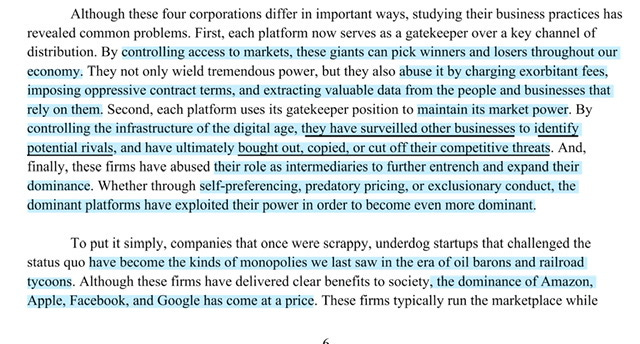

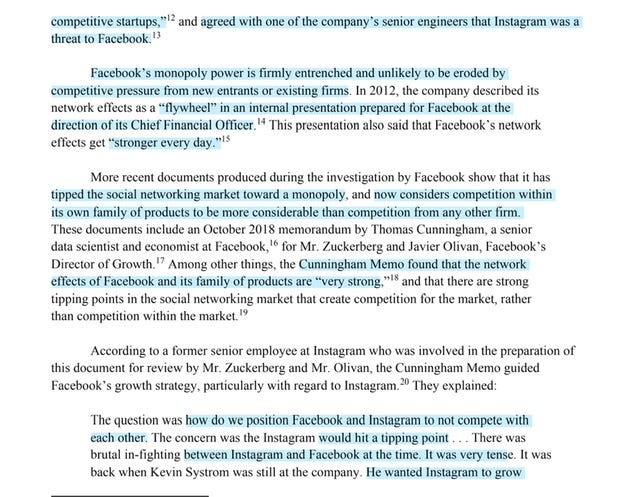

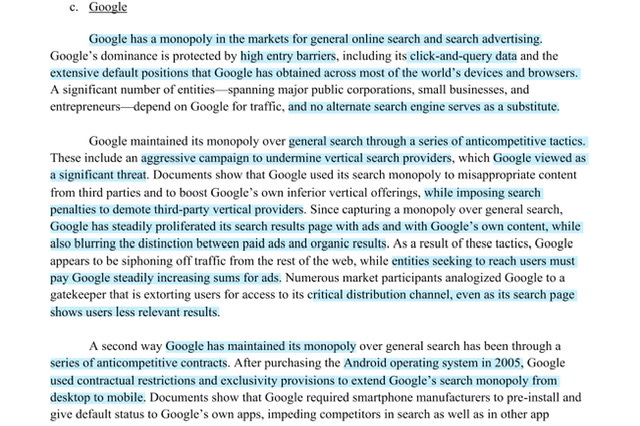

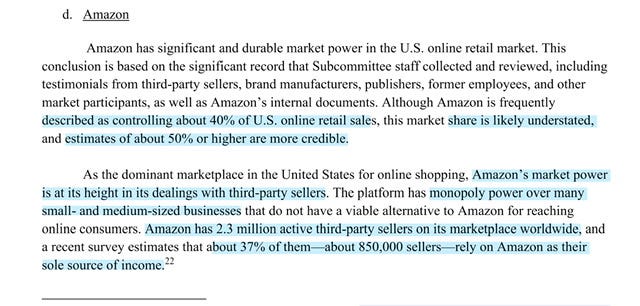
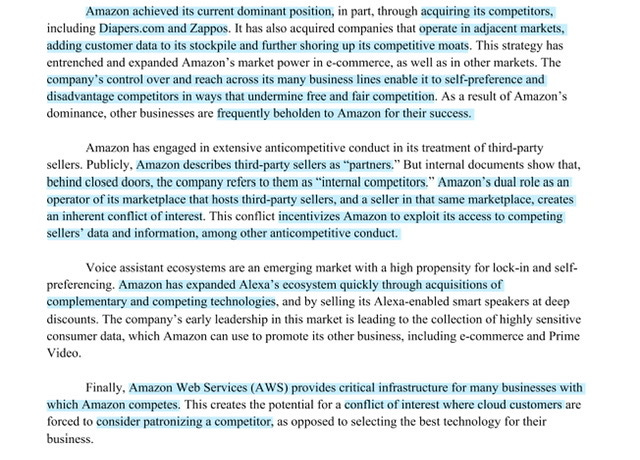


O.M.G. it's about f'in time... Actually, it's about 20 years late, but hey, better late than never. Although, so much damage, in terms of cost, has already been done...